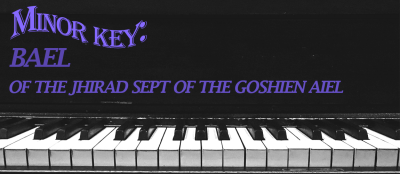Minor Key: Bael of the Jhirad Sept of the Goshien Aiel
Author: Atarah al'Norahn
Published: April 20 2021 Tar Valon Times Blog Link
This article contains spoilers.
“‘Rand al’Thor,’ Bael said loudly, the name slicing through Couladin’s shouts, cutting off the roar of the crowd like a blade.
He stopped to clear his throat, head swinging as though seeking a way out of this. Couladin turned, folding his arms confidently,
no doubt expecting a sentence of death for the wetlander.
The very tall clan chief took a deep breath. ‘Rand al’Thor is the Car’a’carn. Rand al’Thor is he Who Comes With the Dawn.’”
-The Shadow Rising, Chapter 57
With multiple appearances that span the greater part of the series, from The Shadow Rising to A Memory of Light, Bael is one of the leading clan chiefs in terms of narrative development within The Wheel of Time. Although frequently remarked upon for his tremendous height, which exceeds even that of other Aiel, Bael leaves more than just a physical impression on those he encounters. Steadfast, courageous, and possessed of the Aiel sense of humor that continually baffles wetlanders, Bael remains one of Rand’s most trusted advisors from almost the moment of his first introduction.
In some ways, we might say that Bael’s storyline runs parallel to that of Rhuarc, the only Aiel clan chief to receive more page time throughout the series. The two men frequently perform similar narrative functions. Both are early supporters of Rand’s, counted amongst the original five clan chiefs to proclaim him the true Car’a’carn on the fateful day of revelation at Alcair Dal. Each is entrusted with the surveillance of a major city; with Bael in Caemlyn and Rhuarc in Cairhien. Each is husband to two women, a roofmistress and a Wise One; with their marriages setting a precedent for Rand’s own relationships with Elayne, Aviendha, and Min. And both provide necessary caution and advice as Rand’s journey becomes darker, and spirals towards its ultimate end.
However, despite these distinct narrative similarities, Bael is far from a simple recapitulation of Rhuarc. Over the course of the series, Bael facilitates a key moment in the Aiel journey to Tarmon Gai’don, provides crucial insight into Aiel culture and traditions, and helps to point the way towards a viable future for his people beyond the Last Battle.
Although it is Rhuarc who brings Rand to Alcair Dal as He Who Comes With the Dawn, it is Bael who takes the significant first step in verifying Rand’s explosive announcement about the origins of the Aiel. Like the other clan chiefs, Bael displays reluctance to break the traditional silence that shrouds the truth of Rhuidean, telling Rand in the aftermath that his revelation has been “ill done” (TSR, Ch. 58). It is a truth that has been hidden for so long because it brings a despair that kills two out of three men sent to Rhuidean to become clan chiefs. He is so affected by the “long road” now facing the Aiel that he “turns his face away” (TSR, Ch. 58) at Rand’s mention of it. And yet nevertheless, he forges resolutely ahead, unbreaking even as he faces the fulfillment of devastating prophecy. It is his voice, wielding Rand’s name as a blade, that sets the Aiel on their new path.
Although Bael breaks with custom by speaking of Rhuidean, elsewhere in the series he is an important source of information about Aiel traditions. In The Fires of Heaven, once members of the Goshien, Chareen, Nakai, Shaarad, and Taardad clans have crossed the Spine of the World with Rand, Bael’s character presents us with a glimpse into two important aspects of Aiel culture: marriage and blood feuds. The description of Bael’s wedding ceremony to Melaine in Chapter 21 is the only such description in the series. Similarly, the tension between Bael and Jheran, whose Goshien and Shaarad clans hold blood feud with one another, helps to elucidate formalized tensions amongst Aiel clans.
Finally, Bael’s frustration with his useless guardianship of Caemlyn, where he has been set to help a ruler who does not “want or need help” (TGS, Ch. 7), stands as precursor to a major concern that arises in A Memory of Light: that leaving the Aiel idle, with no task to occupy them, can only end in disaster. We see the devastating results of this idleness through Aviendha’s visions of the future in The Towers of Midnight, and it is a problem that will only be resolved in the final book upon the Field of Merrilor. It is here where the Aiel are given a future that will hopefully veer them away from the long road to final destruction.
